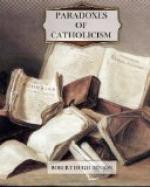(2) And it is this Divine Forgiveness that we ourselves have to extend to those that sin against us, since only those who so forgive can be forgiven. We must not wait until wounded pride is made whole by the conscious shame of our enemy; until the debt is paid by acknowledgment and we are complacent once more in the knowledge that justice has been done to us at last. On the contrary, the only forgiveness that is supernatural, and which, therefore, alone is meritorious, is that which reach out to men’s ignorance and not their knowledge of their need.
THE SECOND WORD
Amen I say to thee, to-day thou shalt be with Me in Paradise.
Our Divine Lord, in this Second Word, immediately applies and illustrates the First and drives its lesson home. He shows us how the rain of mercy that poured out of heaven in answer to the prayer He made just now enlightens the man who, above all others present on Calvary, was the most abjectly ignorant of all; the man who, himself at the very heart of the tragedy, understood it less, probably, than the smallest child on the outskirts of the crowd.
His life had been one long defiance of the laws of both God and man. He had been a member of one of those troops of human vermin that crawl round Jerusalem, raiding solitary houses, attacking solitary travellers, guilty of sins at once the bloodiest and the meanest, comparable only to the French apaches of our own day. Well, he had been gripped at last by the Roman machine, caught in some sordid adventure, and here, resentful and furious and contemptuous, full of bravado and terror, he snarled like a polecat at every human face he saw, snarled and spat at the Divine Face Itself that looked at him from a cross that was like his own; and, since he had not even a spark of the honour that is reputed to exist “among thieves,” taunted his “fellow criminal” for the folly of His “crime.”
“If thou be the Christ, save Thyself and us.”
Again, then, the Paradox is plain enough. Surely an educated priest, or a timid disciple, or a good-hearted dutiful soldier who hated the work he was at, surely one of these will be the first object of Christ’s pardon; and so one of these would have been, if one of ourselves had hung there. But when God forgives, He forgives the most ignorant first—that is, the most remote from forgiveness—and makes, not Peter or Caiphas or the Centurion, but Dismas the thief, the firstfruits of Redemption.




